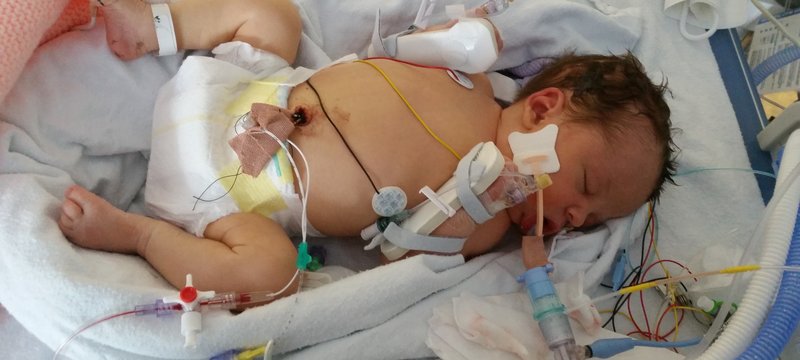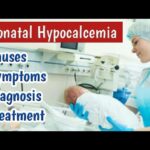Neonatal meningitis is a severe central nervous system (CNS) infection that affects newborns, leading to inflammation of the meninges—the protective membranes surrounding the brain and spinal cord. It is a life-threatening condition requiring urgent medical intervention due to its high morbidity and mortality rates. The disease is primarily caused by bacterial or viral infections, with Group B Streptococcus (GBS) and Escherichia coli (E. coli) being the most common pathogens in neonates. Early diagnosis and aggressive treatment are critical to improving outcomes and preventing neurological complications.

Pathophysiology of Neonatal Meningitis
The infection typically occurs when pathogens invade the bloodstream (sepsis) and cross the blood-brain barrier (BBB), leading to inflammation of the meninges and cerebral damage.
Common Routes of Infection
- Vertical Transmission – From mother to infant during delivery (e.g., GBS, Listeria monocytogenes).
- Hematogenous Spread – Infection enters the bloodstream and reaches the CNS.
- Nosocomial Infection – Acquired in neonatal intensive care units (NICUs), often from invasive procedures (e.g., Klebsiella pneumoniae, Staphylococcus aureus).
Causes and Risk Factors
Bacterial Causes of Neonatal Meningitis
- Group B Streptococcus (GBS) – The most common cause, often transmitted from mother to infant during birth.
- Escherichia coli (E. coli, K1 strain) – Frequently found in preterm neonates.
- Listeria monocytogenes – A rare but severe cause, acquired from contaminated food during pregnancy.
- Klebsiella pneumoniae – Common in NICU-acquired infections.
- Streptococcus pneumoniae and Staphylococcus aureus – Rare but aggressive pathogens.
Viral Causes of Neonatal Meningitis
- Herpes Simplex Virus (HSV) Type 1 and 2 – Severe cases can lead to encephalitis and long-term neurological damage.
- Enteroviruses (Coxsackievirus, Echovirus) – Usually milder than bacterial meningitis.
- Cytomegalovirus (CMV) and Zika Virus – Can cause congenital infections leading to CNS abnormalities.
Risk Factors
- Premature birth (<37 weeks gestation) – Underdeveloped immune system.
- Maternal infection during pregnancy – GBS, urinary tract infections (UTIs), chorioamnionitis.
- Prolonged rupture of membranes (>18 hours) – Increases risk of bacterial invasion.
- Neonatal intensive care unit (NICU) admission – Exposure to hospital-acquired infections.
- Use of invasive devices – Mechanical ventilation, central venous catheters.
Clinical Presentation of Neonatal Meningitis
Neurological Symptoms
- Irritability and high-pitched crying.
- Poor feeding and lethargy.
- Hypotonia (floppiness) or hypertonia (rigidity).
- Bulging fontanelle (indicative of increased intracranial pressure).
- Seizures.
Systemic Symptoms
- Fever or hypothermia.
- Respiratory distress (apnea, tachypnea).
- Jaundice.
- Poor perfusion (pale or mottled skin).
Gastrointestinal Symptoms
- Vomiting.
- Abdominal distension.
- Diarrhea.
Diagnosis of Neonatal Meningitis
1. Lumbar Puncture (CSF Analysis)
- Elevated White Blood Cell (WBC) Count – >20 WBCs/µL suggests infection.
- Increased Protein Levels – Indicates inflammation.
- Decreased Glucose Levels – Bacteria consume glucose, leading to low CSF glucose.
- Gram Stain and Culture – Identifies bacterial pathogens.
2. Blood Tests
- Complete Blood Count (CBC) – Leukocytosis or leukopenia.
- C-Reactive Protein (CRP) and Procalcitonin – Indicators of systemic infection.
- Blood Culture – Identifies bloodstream infections (sepsis).
3. Imaging Studies
- Cranial Ultrasound – Evaluates hydrocephalus or hemorrhage.
- Magnetic Resonance Imaging (MRI) – Detects brain abscesses or ischemic damage.
4. Polymerase Chain Reaction (PCR) for Viral Infections
- HSV PCR – Essential for diagnosing herpes meningitis.
- Enterovirus PCR – Detects non-bacterial causes.
Treatment of Neonatal Meningitis
1. Empirical Antibiotic Therapy (Before Culture Results)
- Ampicillin + Gentamicin – Covers GBS, Listeria, and E. coli.
- Cefotaxime + Vancomycin – Used for hospital-acquired infections.
2. Adjusted Antibiotic Therapy (Based on Culture Results)
- GBS Meningitis – Penicillin G or ampicillin for 14–21 days.
- E. coli Meningitis – Cefotaxime for 21 days.
- Listeria Meningitis – Ampicillin + gentamicin for 21–28 days.
3. Antiviral Therapy
- Acyclovir (20 mg/kg IV every 8 hours for 21 days) – Used for HSV meningitis.
4. Supportive Care
- Seizure Management – Phenobarbital or levetiracetam.
- Intravenous Fluids and Electrolytes – Prevent dehydration.
- Oxygen Support – For respiratory distress.

